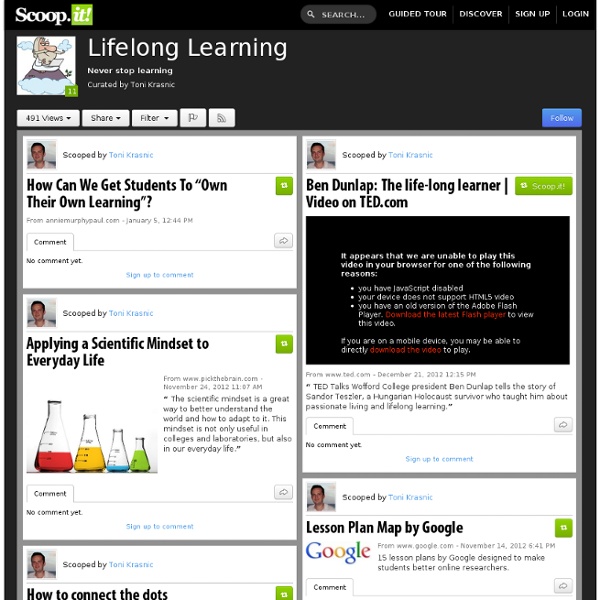



Cyborg Lives Learning a living Hacking Knowledge: 77 Ways to Learn Faster, Deeper, and Better If someone granted you one wish, what do you imagine you would want out of life that you haven’t gotten yet? For many people, it would be self-improvement and knowledge. Newcounter knowledge is the backbone of society’s progress. Great thinkers such as Leonardo da Vinci, Thomas Edison, Benjamin Franklin, Albert Einstein, and others’ quests for knowledge have led society to many of the marvels we enjoy today. Life-changing knowledge does typically require advanced learning techniques. Health Shake a leg. Balance Sleep on it. Perspective and Focus Change your focus, part 2. Recall Techniques Listen to music. Visual Aids Every picture tells a story. Verbal and Auditory Techniques Stimulate ideas. Kinesthetic Techniques Write, don’t type. Self-Motivation Techniques Give yourself credit. Supplemental Techniques Read as much as you can. For Teachers, Tutors, and Parents Be engaging. For Students and Self-Studiers Be engaged. Parting Advice Persist. Sources For This Article Did you enjoy this article?
Knowmads, Infocology of the future 3 Key Elements The lesson you never got taught in school: How to learn! | Neurobonkers A paper published in Psychological Science in the Public Interest evaluated ten techniques for improving learning, ranging from mnemonics to highlighting and came to some surprising conclusions. The report is quite a heavy document so I’ve summarised the techniques below based on the conclusions of the report regarding effectiveness of each technique. Be aware that everyone thinks they have their own style of learning (they don't, according to the latest research), and the evidence suggests that just because a technique works or does not work for other people does not necessarily mean it will or won’t work well for you. If you want to know how to revise or learn most effectively you will still want to experiment on yourself a little with each technique before writing any of them off. Elaborative Interrogation (Rating = moderate) A method involving creating explanations for why stated facts are true. An example of elaborative interrogation for the above paragraph could be: Reference:
Buiding a better world HM Inspectorate of Education "Resist Googling" & 5 Other Strategies For Meaningful Modern Research “Resist Googling” & 5 Other Strategies For Meaningful Modern Research by Jane Healey, Ph.D It’s the start of a new school year, and many teachers will be planning research projects for their classes. Inquiry-based learning is one of the current buzz phrases, meaning students should ask and answer questions as a primary method in the classroom. It’s a great initiative, but it puts teachers on the hot seat. Most people teaching today weren’t trained to instruct students about researching in a technologically advanced world. 1. Most adults in a school environment can easily use Google to search for information. Students don’t know how the search engine works or makes money, and they usually can’t judge a site’s credibility even while using it. Google isn’t “bad”; everyone, including students uses it for general information answers. 2. Many schools use LibGuides to keep students off popular search engines and focused on a specific range of useful resources. 3. 4. 5. 6.
Geography Education A Core Curriculum To Create Engaged Entrepreneurs Nearly 50% of students today leave college without earning a degree. The data suggests students drop out from lack of funds, interest, mentorship, and real world relevance. Even at elite private universities where student completion rates soar to over 90%, everyone is in reform mode, trying to find the best education students need for the complex, fast-action webby world they are inheriting. Some want to argue that online course offerings (including those offered free by universities like MIT, Harvard, or Carnegie Mellon) are the answer. So how do we change higher ed to better fit an interconnected, globally volatile, politically vexed, and ever-changing world? The opposition of “liberal arts” and “vocational education” carries with it a lot of residual 19th-century class snobbery as well as 20th-century quantitative bias. A Start-Up Core Curriculum would take up the first two years of college. That’s a great start.
Collective consciousness 50 Famously Successful People Who Failed At First By Joel Brown on May 3, 2011 Not everyone who’s on top today got there with success after success. More often than not, those who history best remembers were faced with numerous obstacles that forced them to work harder and show more determination than others. Next time you’re feeling down about your failures in college or in a career, keep these fifty famous people in mind and remind yourself that sometimes failure is just the first step towards success. Business Gurus These businessmen and the companies they founded are today known around the world, but as these stories show, their beginnings weren’t always smooth. Henry Ford: While Ford is today known for his innovative assembly line and American-made cars, he wasn’t an instant success. Scientists and Thinkers These people are often regarded as some of the greatest minds of our century, but they often had to face great obstacles, the ridicule of their peers and the animosity of society. Inventors Public Figures Hollywood Types Musicians